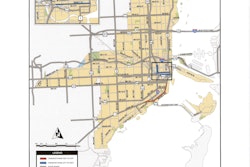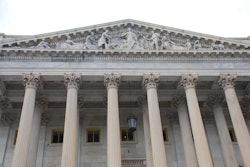 ( Photo: POD Point / Flickr)
( Photo: POD Point / Flickr)A recent article on CNN‘s website called attention to efforts by a handful of states to collect infrastructure revenues from electric vehicles (EVs), which operate without gasoline or diesel fuel and thus do not contribute to road and bridge budgets.
The article detailed how Washington State legislators passed a $100 annual flat tax on EVs last year and several other states have similar legislation pending. Washington’s law omits hybrids from the flat tax.
Government road agencies have fretted for years over the specter of declining fuel tax revenues resulting from the growing popularity of hybrids and electric vehicles, and the problem is coming to a head now as the overall fuel efficiency of the U.S. fleet is increasing while vehicle miles travelled are trending upward. Put another way, road and bridge revenues are flat or declining while usage (wear and tear) is increasing.
While electric vehicles are a tiny part of the U.S. market at the moment, they have the potential to become a much more substantial part of the American fleet. General Motors has launched a highly publicized entry into the market and is currently working on a vehicle with a 200-mile operating range.
The recently introduced Tesla has won acclaim from car critics and owners alike; it is a high-performance sports sedan that does 0 to 60 mph in less than 6 seconds (the ‘S’ version gets there in 4.2 seconds) and has a battery charge range of more than 200 miles.
And as huge of a jump as the Volt and the Tesla are to the EVs of just a few years ago, there may be many more such leaps to come.
BBC News recently profiled an electric car that had been entered in this year’s 24-hour Le Mans endurance race but was pulled in early June because its owners had not had sufficient time to test its durability.
The GreenGT H2 prototype racer uses hydrogen fuel cells to generate electricity to power its electric motors. The vehicle is said to have a maximum speed of 200 mph and would run 40 to 50 minutes at racing speeds between refuelings. The refueling process takes less than three minutes.
With the potential for a rapid expansion of non-gasoline-burning vehicles using American roads, it makes sense to deal now with the issue of those owners paying their fair share of the cost of building and maintaining our roads and bridges. However, that notion isn’t universally popular. EV advocates fear taxes like Washington’s will discourage people from buying electric cars. They argue that, because of the EV’s smaller environmental footprint, there is a “greater good” argument for holding off on highway taxes until the technology is established.
Judging from the spirited debate among readers in the posts following the CNN article, the subject is also good for a very pointed debate about who is entitled to what when it comes time to pay for the American transportation infrastructure.










